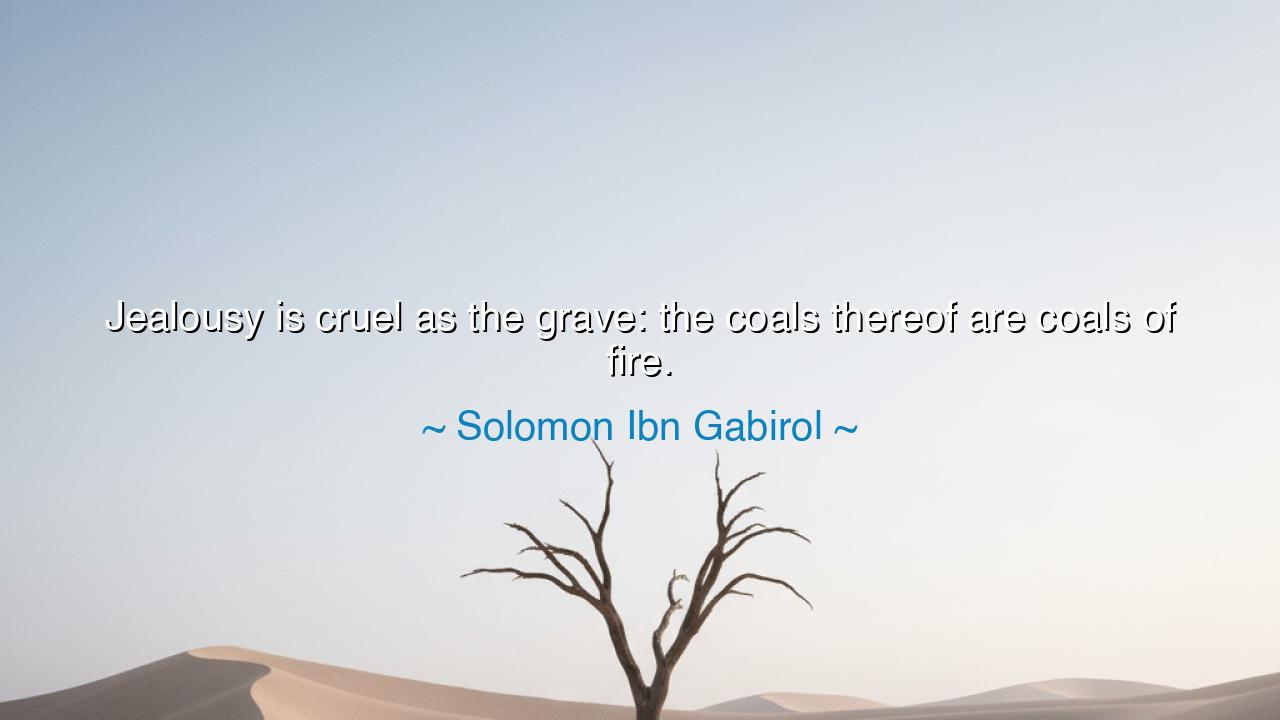
Jealousy is cruel as the grave: the coals thereof are coals of






Hearken, children of wisdom, and mark well the words of Solomon Ibn Gabirol, a sage whose mind gleamed like a beacon in the shadowed corridors of time. He declared, “Jealousy is cruel as the grave: the coals thereof are coals of fire.” Here, in the simple cadence of the phrase, lies a profound truth: the heart consumed by jealousy becomes as cold, dark, and unyielding as the tomb, yet within it smolders a fire capable of consuming all that it touches. Consider this not as mere poetry, but as a mirror to the soul, warning that envy, when left unbridled, is a silent destroyer of joy and of peace.
In the world of men and women, jealousy often rises like a shadow, creeping over the spirit unnoticed, yet carrying with it the sting of bitterness. It is cruel, for it strikes not only the object of its gaze, but the bearer as well. A man who envies his brother’s fortune or a woman who longs for her neighbor’s beauty finds their own heart shackled to dissatisfaction. Just as the grave consumes the body, jealousy consumes the soul, leaving a hollowness that no gold, no power, and no achievement can fill. It is a grave from which one cannot escape, unless wisdom and self-awareness intervene.
The coals of fire Ibn Gabirol speaks of are the passions and resentments that burn within the heart. Left unattended, these embers flare into flames, igniting conflicts, tearing friendships, and corrupting noble intentions. History is replete with examples of empires and families undone by the jealous hearts of rulers. Recall the tale of Aaron Burr and Alexander Hamilton in the young United States: envy and ambition, when mingled with pride and misunderstanding, led to a duel that extinguished a bright life. Therein lies a warning—the fire of jealousy destroys both the object and the bearer.
Consider too the story of a renowned artist in Florence, who saw his rival rise to fame while his own works languished in obscurity. In his heart, jealousy burned like a hidden fire, and he allowed bitterness to guide his actions. He betrayed colleagues, undermined friends, and lost the favor of patrons. In time, he found himself alone, shunned, and embittered, while the rival he had envied continued to flourish, unaware of the shadow that had stalked him. The lesson was clear: the fire of envy consumes the one who holds it far more than it harms its intended target.
Yet the ancients did not speak only of warning; they also taught the remedy. To conquer jealousy, one must cultivate contentment, gratitude, and self-knowledge. One must see the success of another not as a threat, but as a reflection of the boundless possibilities of life. When we extinguish the coals of envy within, we free ourselves from the cruel, cold grave that Ibn Gabirol so vividly describes. In its place blooms a warmth of heart, generous and resilient, capable of forging bonds rather than breaking them.
Let us also remember that jealousy often masquerades as ambition or concern; its subtlety is its greatest cruelty. Many have justified their bitterness as rightful desire, failing to recognize the inward decay it causes. A ruler, a scholar, a spouse, or a child—none are immune. The coals of fire can smolder for years, hidden beneath the surface, until a moment of weakness allows them to flare. Vigilance over the heart, mindfulness of intentions, and the cultivation of empathy are shields against this insidious flame.
Therefore, let the lesson of Ibn Gabirol echo in our souls across generations: guard your heart against jealousy, for it is the cruel grave of the spirit. Nurture instead admiration for the virtues and successes of others, and let gratitude light the way. In practice, this might mean celebrating the achievements of colleagues, mentoring those who excel where we lag, or finding joy in the simple blessings of life. These acts, small though they may seem, quench the coals before they become fire, preserving peace and dignity.
Thus, children of wisdom, remember that jealousy is not merely a feeling, but a perilous force that shapes destinies. The grave may claim the body, but the coals of fire can claim the soul even in life. Tend your inner fire with care; let compassion, gratitude, and humility be the kindling that nourishes your heart. By doing so, you walk in the light of understanding, leaving behind the darkness and cruelty of envy, and embracing a life of enduring peace and noble purpose.
If you want, I can also craft a short, impactful 2–3 sentence version of this explanation that could be read aloud like a reflective meditation. Do you want me to do that?






AAdministratorAdministrator
Welcome, honored guests. Please leave a comment, we will respond soon